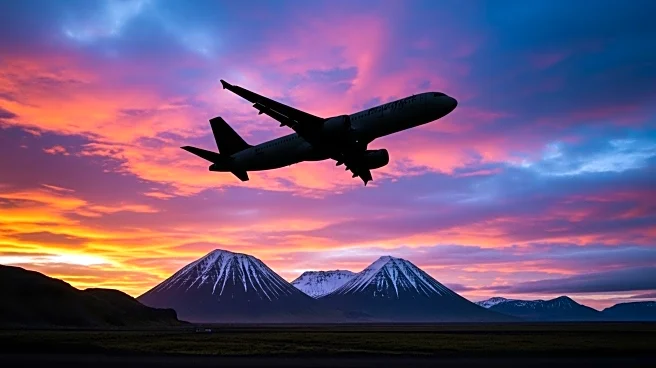What's Happening?
PLAY, Iceland's major low-cost airline, has ceased operations as of September 29, cancelling all flights immediately. The decision follows a series of operational challenges, including weak financial results, declining ticket sales, and internal conflicts among employees. PLAY, which was an incarnation of WOW Air, faced similar issues as its predecessor, which ceased operations in March 2019. The collapse of PLAY is expected to have repercussions on Iceland's tourism industry, although the impact may be less severe than the WOW Air collapse. Tour operators are adjusting their strategies in response to the airline's demise.
Why It's Important?
The cessation of PLAY's operations is significant for Iceland's tourism industry, which relies heavily on air travel to bring visitors to the island. PLAY accounted for approximately 10-12% of foreign visitors, translating to around 220,000 travelers annually. The airline's collapse adds to existing uncertainties in Iceland's tourism sector, including volcanic activity, exchange rate fluctuations, and potential tax increases. However, other airlines like Icelandair, SAS, and Finnair are increasing capacity, which may mitigate some of the negative impacts. The situation underscores the need for dialogue between the government and the tourism sector to stabilize pricing and policies.
What's Next?
In response to PLAY's collapse, tour operators are revising their offers and reducing prices to attract visitors. Companies like Traveo, Arctic Adventure, and Troll.is are offering discounts on tours to maintain business stability. The government and tourism industry are expected to engage in discussions to find a balance in pricing and policies, ensuring Iceland remains an attractive destination for travelers. The increased capacity from other airlines may help offset the loss of PLAY's services.
Beyond the Headlines
The demise of PLAY highlights the vulnerability of low-cost airlines in the face of financial and operational challenges. It also raises questions about the sustainability of Iceland's tourism industry, which is heavily dependent on air travel. The situation may prompt a reevaluation of tourism strategies and policies to ensure long-term stability and growth.









